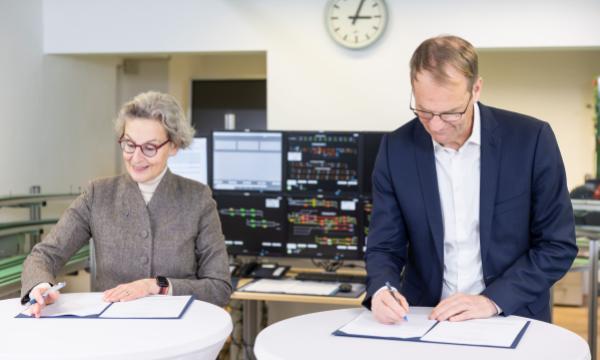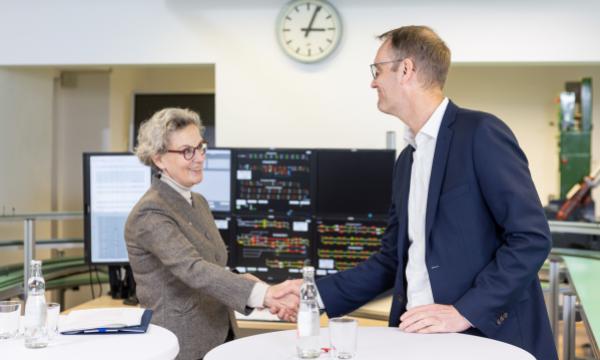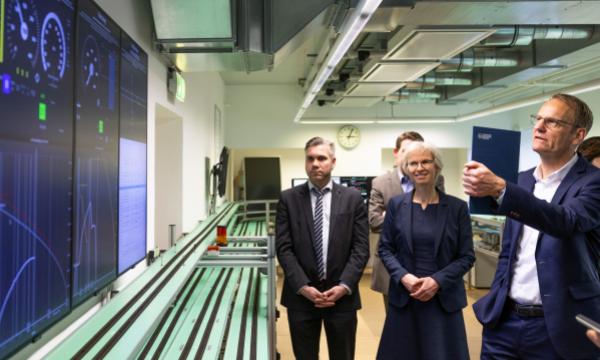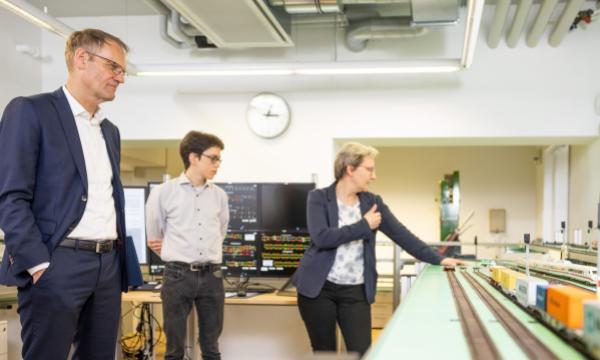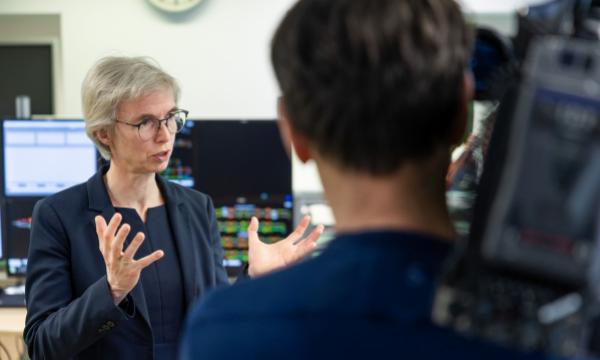
You are here
Expansion of research and teaching in the railway sector
Investment of seven million euros over ten years / Position of the head of the professorship advertised on 28 February 2024 / Deutsche Bahn aims to recruit up to 1,000 academic graduates for the digital railway system
The demand for specialists for the expansion of the digital railway system in Germany (Digitale Schiene Deutschland) will continue to increase in the coming years. In order to secure expertise in Germany as a business location in the long term, Deutsche Bahn (DB) and the Technische Universität Dresden (TU Dresden/TUD) are establishing an endowed Chair of Digital Railway Systems at the "Friedrich List" Faculty of Transport and Traffic Sciences at the TU Dresden.
On 28 February, 2024, Dr. Volker Hentschel, Board Representative for Digital Rail for Germany, and Prof. Dr. Ursula M. Staudinger, Rector of TU Dresden, signed the agreement in the Railway Operation Laboratory at TU Dresden.
Dr. Volker Hentschel, Board Representative for Digital Rail for Germany: "With the endowed Chair of Digital Railway Systems, we are investing seven million euros in the future of rail transport and the performance of the railways. Together with TU Dresden, we are securing urgently needed expertise in Germany to drive forward the expansion of digital infrastructure. We want to attract up to 1,000 academic specialists. With Digitale Schiene, we are creating more space for trains on existing tracks and increasing reliability for our passengers."
Prof. Dr. Ursula M. Staudinger, rector of TU Dresden: "Achieving the ambitious goals of Digitale Schiene Deutschland requires specific expertise. We want to develop this further at TU Dresden together with DB. The endowed Chair of Digital Railway Systems underlines the trust placed in us. Endowed professorships are bridges between business and research. The new Chair strengthens our potential area of "Automated and Networked Mobility". The future research results and the trained young professionals are important factors for the development of future-proof and sustainable mobility systems. The rail system plays an essential role in this."
Impressions
Impressions
Impressions
Call for applications also published on 28 February 2024
The chair is initially funded for ten years. The funding includes one professorship, three research assistants, two research support staff as well as administration and secretarial services. Scholarships will also be awarded to students in order to attract new students to the degree programmes. Just in time for the official signing event, the position as "Professorship (W3) for Digital Railway Systems" has been published by the TU Dresden (to the advertisement in German and to the advertisement in English).
The research activities at the new endowed Chair of Digital Railway Systems focus in particular on digital control and safety technology. The aim is to advance the development of methods for analysing and designing safe technical systems. The focus lies on the areas of safety and risk assessment, end-to-end digital data management, technical analyses, and approval procedures for railway systems. Innovative methods from operations research, formal methods, artificial intelligence, modelling, and simulation are used.
Unique in Germany: 6 Railway Chairs on Rail Transport of the Future
The "Friedrich List" Faculty of Transport and Traffic Sciences is looking forward to welcoming the new professorship and the new colleague with excitement and anticipation. Dean Prof. Dr.-Ing. Regine Gerike comments: "As the only faculty in Germany dedicated to Transport and Traffic Sciences, we are pioneers in research and teaching in the development of systemic solutions for the design of safe, efficient, and sustainable transport systems. Our holistic research approach is based on technical, economic, ecological and social criteria. The railway system makes a particular contribution to these criteria. With the new endowed professorship, a total of 6 railway professorships at our faculty will conduct research into the rail transport of the future - from very different but wonderfully complementary perspectives. This is unique in Germany."
To the Call for Applications for Chair of Digital Railway Systems
Published on 28 February 2024 on the TU Dresden website.
About TU Dresden
As a university of excellence, the Technische Universität Dresden (TUD) is one of the most powerful research institutions in Germany. With around 8,300 employees and around 29,000 students in 17 faculties, it is one of the largest technically orientated universities.
Founded in 1828, today it is a globally orientated, regionally anchored top university that aims to make innovative contributions to solving global challenges.
In research and teaching, it combines engineering and natural sciences with the humanities, social sciences and medicine. This nationwide outstanding diversity of subjects enables the university to promote interdisciplinarity and bring science into society.
About the "Friedrich List" Faculty of Transport and Traffic Sciences
The "Friedrich List" Faculty of Transport and Traffic Sciences at the TU Dresden is the only faculty in Germany dedicated to transport and traffic sciences and is an internationally recognised authority on sustainable mobility.
The faculty is a pioneer in the development of systemic solutions for the design of safe, efficient and sustainable transport systems according to technical, economic, ecological and social criteria.
For practical applications in research and teaching, around 200 researchers and 1,000 students have around 30 laboratories and experimental and test facilities at their disposal.
Contact at the Friedrich List" Faculty of Transport and Traffic Sciences
Dr. Michael Krieg
Managing Director
"Friedrich List" Faculty of Transport and Traffic Sciences
TU Dresden
E-Mail: michael.krieg1@tu-dresden.de
With the endowed Chair of Digital Railway Systems, we are investing seven million euros in the future of rail transport and the performance of the railways. Together with TU Dresden, we are securing urgently needed expertise in Germany to drive forward the expansion of digital infrastructure.

